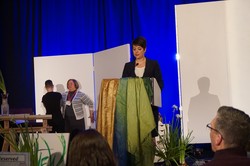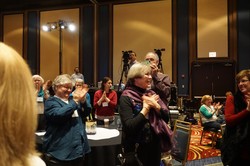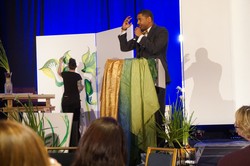If God is doing a new thing—in accordance with the theme from Isaiah 43 of this year’s Association of Presbyterian Church Educators (APCE) annual event—then God is surely doing it through the Rev. Otis Moss III.
In a sermon based on Mark 11:15-18, Moss—author, speaker, activist, and senior pastor of Trinity United Church of Christ in Chicago—opened his message by inviting members of the capacity crowd of over 750 attendees to turn to their neighbor and say, “I love Jesus, but at times I can’t stand the church.”
Starting with the research of author Dan Kimball about millennials in his book, They Like Jesus but Not the Church: Insights from Emerging Generations, Moss said that for both young and old alike, there is a “deep disconnect between Jesus and what we perceive to be the church.”
“Jesus is always perceived as loving, inclusive, compassionate…an advocate for the poor,” preached Moss. “Jesus is viewed as admirable, affirming, and a paradigm for emulation.”
Moss said this perception holds true even for people outside of the Christian faith.
Yet when the same question is posed about the church, he continued, a completely different answer arises, including the naming of such attributes as hateful, racist, homophobic, and corrupt.
“As a preacher’s kid, I must make a confession today,” said Moss. “You know what they say that confession is good for the soul but bad for your reputation. How can I, as an apologist for the church—as one who grew up in the citadel of hope known as the church—make the same statement made by many millennials, ‘I love Jesus, but there are times when I can’t stand the church.”

Shannon Kershner leads worship —Emily Enders Odom
In a hypnotic string of graceful alliterations, Moss said that the church, “which should be a place of forgiveness, faith, and fidelity; hope, healing, and humanity; laughter, love, and liberation; prophetic, powerful, and prayerful; compassionate, caring, and congenial; admirable, approachable, and amicable” has instead become dissonant, divergent, and dismissive, and not in any way resembling Jesus Christ.
In a careful exegesis of Mark 11, Moss explained that “as soon as [Jesus] comes into the synagogue, he has some issues. People have turned it into a place that is market driven and not mission focused.”
Jesus, Moss said, was not there to destroy the temple, only the actions taking place inside of it.
“Jesus was upset at this particular moment,” he said. “Sometimes you have to turn over a few tables to get people’s attention. You need a new methodology. Jesus is always using a different methodology to reach God’s people. For some to be healed, all they have to do is touch the hem. Some need mud in the eye. The method of how Jesus heals will change.”
Moss then rattled off a list of listening technologies, from 78 records to MP3s, asking listeners to respond to the platforms they remembered and used.
“Let me break something down for you,” he then said. “You can take ‘Amazing Grace’ and play it on any of those devices. It’s the same song but played by a different method. We are 8-track churches in an MP3 world. We have to change the methodology.”
A market mentality, Moss said, has replaced a ministry mindset. When Jesus saw people making money off of the poorest of the poor, he didn’t recognize what the church had been called to do.
“’This is not what my Father has asked for; let me kick over a few tables,” Moss said of Jesus’ response to the moneychangers in the temple. “He wanted to do some renovation of the church. We need some radical renovation; some tables need to be kicked over in churches, denominations. You haven’t stayed the same; why should the church stay the same?”
Moss closed his message with a story about a lighthouse ship, a vessel designed to save other ships and to make sure other people in trouble made their way back to shore.
Unlike a stationary lighthouse, “This ship can go out to where there’s trouble,” Moss said of the church’s “lighthouse mentality.”
“We don’t want to go out into deep water,” he said. “We can go out to where people are in trouble and bring them back to shore. We need more lighthouse movements that are willing to go out. It’s ‘The Old Ship of Zion’: everybody is to get on board…there should not be a divergence between Jesus and the church.”
Moss charged his listeners to “go on home and run some folk out, kick over a few tables. Be a lighthouse ship to change our church, our nation, our world. Be a lighthouse ship and not just a lighthouse!”

Candace Hill honored. —Emily Enders Odom
As neighbors were again asked to turn to each other to respond to a list of questions following the sermon in preparation for a time of prayer, Dianna Wright, associate presbyter and African-American advocate for Salem Presbytery (N.C.), said, “We need to find a way to take our power back to be more like Jesus—to be willing to overturn everything for the sake of the life of the church. We have gone so far from the message of Jesus in how we live our life. People don’t see Jesus in the way we are church. That is not just true for churches in transition, but for issues we face with people who want to leave the denomination.”
The opening gathering also featured the greetings, remarks, and leadership of the Rev. Zeta Touchton Lamberson, president of APCE’s executive council; Heath Rada, Moderator of the 221st General Assembly (2014); the Rev. Shannon Kershner, pastor of Fourth Presbyterian Church, Chicago; and event co-chairs, Roberta Dodds-Ingersoll and Bonnie Edwards. Candace Hill, who recently retired as coordinator of educational ministries for the Presbyterian Church (U.S.A.), was also honored with applause during the opening gathering for her many contributions to APCE and the church.

